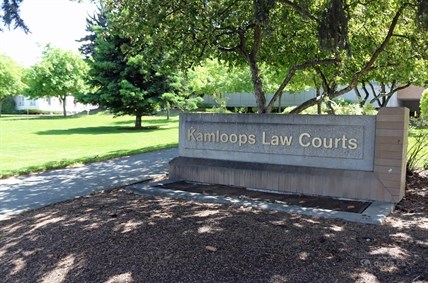
(JENNIFER STAHN / iNFOnews.ca)
December 11, 2014 - 2:30 PM
KAMLOOPS – A Vancouver traffic cop with over 20 years of experience learned a few lessons in court this week after he tried to help a friend fight a speeding ticket.
Nelson Humberto Dossantos Teixeira had Const. Gerald Wickstead from the Vancouver Police Department represent him in an appeal hearing on Wednesday to challenge the $368 speeding ticket he got for a radar reading of 147 km/h on a 100 km/h highway near Merritt.
Wickstead may have had an argument in traffic court, but this was a B.C. Supreme Court appeal, with far more intricacies and tighter rules. He referred to Justice Jeanne Watchuk as 'Your Honour' or 'Your Worship' and had to be corrected to use the title "My Lady." Same went for his attempts to argue in court. Watchuk and the Crown had to stop him several times because he wanted to introduce new evidence that couldn't be considered on appeal. Watchuk dismissed Teixeira's appeal on Thursday morning.
He tried to argue the officer who issued the ticket was guilty of "sloppy police work" when she gave his co-worker a speeding ticket.
Teixeira tried to fight the ticket in traffic court, but never asked the ticketing officer if she calibrated her radar, if she lost sight of the vehicle while she was pursuing it, or whether she knew if it was Teixeira's car or a nearby truck that was speeding on the highway.
Wickstead said Teixeira was travelling in front of a truck on the highway and the officer did not note speeds on both vehicles as they passed her, suggesting it was the pickup truck behind Texeira’s car that registered the 147 km/h speed.
Crown Prosecutor Tim Livingston, after making several objections, said Teixeira had a chance to cross-examine the police officer and ask her about the specifics of her radar equipment or all the other elements of her police work in traffic court. To present it now, Livingston said, and make a judgment on it would be unfair without hearing from the officer involved in the case.
“It’s simply not enough to do a limited cross examination, to not ask those questions at the trial and then say on appeal ‘well these things aren’t proven,’” Livingston said. “At the bare minimum the Crown says that officer has the right to be confronted with that case and confronted with those facts.”
Wickstead continually described past experiences he had as a police officer and showed radar equipment including its manual but was stopped short by the prosecutor and judge who repeatedly told him that he was introducing evidence.
“So am I not allowed to say that she should have got two readings rather than one on the radar? That once the first vehicle past her that the second vehicle’s radar would have been on there? That was not entered and she said she got a constant reading of 147. That cannot be said?” Wickstead asked.
Watchuk replied: “Correct. That’s evidence. That’s exactly what evidence is, Mr. Wickstead. If this was a new trial I expect you would have been called as an expert witness and could speak about the operation of the radar from your extensive experience.... I appreciate that the process is frustrating.”
After hearing Watchuk's decision, Wickstead persisted and told the court he had video evidence of the event. He was told by the Justice that he didn't bring up the video once during the several hours he spent in court and it was too late.
To contact the reporter for this story, email Glynn Brothen at gbrothen@infonews.ca or call 250-319-7494. To contact the editor, email mjones@infonews.ca or call 250-718-2724.
News from © iNFOnews, 2014